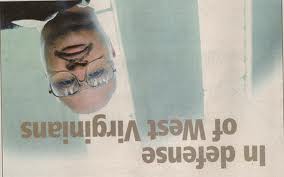Editorial – The Charleston Gazette - August 6, 2013
CHARLESTON, W.Va. — Last week, four major Republicans who each once headed the U.S. Environmental Protection Agency — William Ruckelshaus, Lee Thomas, William Reilly and Christine Todd Whitman — called for the GOP to support President Obama’s effort to curb carbon pollution that causes global warming. In a New York Times commentary, they wrote:
“There is no longer any credible scientific debate about the basic facts: Our world continues to warm, with the last decade the hottest in modern records, and the deep ocean warming faster than the earth’s atmosphere. Sea level is rising. Arctic Sea ice is melting faster than projected. … Climate change puts all our progress and our successes at risk.”
Bravo. We hope these influential voices have an impact on Washington’s political paralysis.
In June, we shared the tale of Bob Inglis, a conservative Republican former congressman from South Carolina — and former climate change denier. Now, as executive director of the Energy and Enterprise Initiative at George Mason University, he travels the country to support using market forces to reduce greenhouse gas emissions.
Could it work? Inglis advocates taxing carbon at the source, such as mines and wells. High-carbon energy costs more to produce and to use than the market currently reflects. If those costs were accurately included in the price everyone pays, it would create an incentive to develop cleaner, cheaper energy.
A number of people seem to agree. In May, The Washington Post called a carbon tax “an elegant policy Congress could immediately take off the shelf.”
“It would make polluters pay for their own pollution, which is the best way to encourage greener thinking,” the Post said. “It would cut emissions without overspending national wealth on grandiose central planning.”
Inglis is among those who would want such a carbon tax to be revenue-neutral. He believes companies that would pay higher taxes on carbon should see other taxes reduced. The goal is to create incentive, not revenue.
But 67 percent of voters think taxing carbon is a better way to reduce the deficit than cutting spending, according to a survey of 1,000 voters conducted for Friends of the Earth. The poll found that 93 percent of Democrats and 66 percent of Republicans approved of such a tax.
Also, the Congressional Budget Office has warned that delaying efforts to cut carbon dioxide emissions could mean “catastrophic” losses for the U.S. economy, as global warming causes more billion-dollar storms, floods and other ravages from climate change.
A carbon tax would have to be deftly handled in places like coal-rich West Virginia to curtail harm to working people and their families. But wouldn’t it be great to be part of innovation and the creation of new wealth and industry?
Elected officials who sit in Washington (or Charleston) with their fingers in their ears during discussion of climate change are out of touch. As one of the largest economies in the world, the United States should be leading on this reform.
The Washington Post put it best: “The carbon tax is one of the best ideas in Washington almost no one in Congress will talk about.”
NOTE: See also: www.EcoWatch.org

